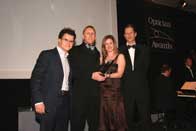Faced with increasing competition from alternative supply routes, optical practices may have seen little opportunity for growth in the contact lens sector in 2005. Yet all four practices shortlisted for the 2006 Contact Lens Practice of the Year succeeded in growing their business by implementing strategies aimed at attracting and retaining contact lens patients. All offered a wide range of lens types and took a proactive approach to recommending contact lenses. And all had systems in place to measure the effectiveness of their strategies for growth.

Unusually, all the entries in this category came from independent practices, although the businesses varied widely in size, location and patient demographics. The winning practice, Querido & Davidson, is a small independent practice on the outskirts of Newcastle-upon-Tyne with a team of three optometrists, all experienced in contact lenses, and four support staff.
Register now to continue reading
Thank you for visiting Optician Online. Register now to access up to 10 news and opinion articles a month.
Register
Already have an account? Sign in here


